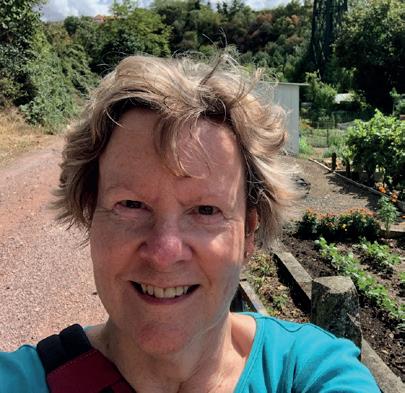
6 minute read
Book Club
Making your ending compelling
by Alison Morton
You’ve started your story, it’s progressing nicely through Act 1 and Act 2, but how do you end it? The one big rule for tying up your story is that no new expositional information or characters may be parachuted into the story at this final stage. If something or somebody appears in the final act, it or they must have been foreshadowed, referenced or already in play.
The inside conflict
Have a plan!
Has the main character conquered the inner demons that have stood in her way? She may have started to face up to them in Act 2, even if hesitatingly. But often, an inner demon tries one last attempt at supremacy over the psyche of the protagonist at the beginning of the final act. However, having learnt through experience and grown into her character, our heroine understands how differently she must act if she is to survive and reach her goal.
If your story planning strategy relies on creating a series of drafts, rather than using an outline, you might find yourself needing to write a fair number of drafts in order to understand what Act 3 should be. Rewriting the whole draft is really a corrective measure. The creative flow is extremely important, but without a plan, however rough, you can find yourself wandering down blind alleys and becoming stuck up the proverbial gum tree. The heroine then applies that inner learning curve to facing the exterior conflict that’s been blocking her path. Just look at Pride & Prejudice… From that decision point, the main character should demonstrate courage, creativity and out-of-the-box thinking in setting the cogs in motion that will resolve the story.
Has the main character become appealing?
If you’re a ‘pantser’ (writing by the seat of your pants) instead of a plotter (outlining what happens in each chapter in painstaking detail), you may not be able to pull all the threads into a satisfactory end knot. A judicious mix is the best solution so that you do know where you are going but are not tied up to the extent that your creativity suffers.
I use a ‘wireframe’ of thirty plot lines built around inciting incident, three crisis or turning points, the dark moment where everything falls apart, resilience, climax and resolution. Each of my thirty lines will only be about ten words, mostly in note form. And Line 30 is how the book will end. Then I get writing. This process works out at 15% plotting and 85% ‘pantsing’. By Act 3, the reader has come to know the protagonist, her values and desires, and wants the newly aware heroine, or hero, to succeed. The more the reader feels the ending through the main character’s heroism, the more effective the ending will be. If you can make the reader cry, cheer and applaud, then you will keep that reader to the last page.
The main character does the heavy lifting
The protagonist of a story should be the one to drive it to the end. She can’t merely sit around and observe or merely narrate the ending. Nor can she settle for a supporting role, and most of all, she can’t be ‘rescued’. She (or he) must be the ‘rescuer’, whatever the genre. ‘Appealing’ doesn’t necessarily mean attractive, optimistic and good-hearted. A ‘bad guy’ character with dubious morality, strange personal habits and/or murderous intent can be equally engaging. Combining an element of planning, developing characters fully and ensuring your protagonist stays at the steering wheel will bring your story to a strong and satisfactory finish. Happy endings!
Alison has compiled a selection of articles from this column into ‘The 500 Word Writing Buddy’, available in print and ebook. Her new Roma Nova novel, set in the 4th century, JULIA PRIMA, is now out.

This Month’s Book Reviews
A Year at the French Farmhouse by Gillian Harvey
Review by Jacqui Brown
This is my local author selection for this month as Gillian Harvey lives with her family in the Limousin, which is also the setting for this book. Daisy and Ben’s lives are suddenly thrown into a turmoil neither of them could have anticipated. First Daisy is made redundant, then she mistakenly buys the cottage of ‘their’ dreams in rural France, and then Ben admits he can’t follow her to the new life they had been talking about for decades. What follows is at the same time sad, funny and full of promise, as Daisy throws herself into completing the purchase of a cottage she hasn’t seen and begins the first steps in making a life for herself in France. Daisy was a character who was easy to warm to. I felt her sadness at the changes thrust upon her, but her enthusiasm for her new adventure shone through, despite the frustrations as she tried to adapt to the French ways. What stood out for me the most was the Frenchness of this book and especially the characters we meet. It was obvious that the author has extensive experience of life in rural France, and she has cleverly crafted some lovely characters that I could imagine bumping into in my corner of France, which isn’t too far from where she and her family now call home. She has created a clever mix of keeping the romance of a new life in France alive, for those who read books like this to fuel their dreams, as well as not shying away from the challenges a move like this invariable throws you. Add into the mix a complicated family situation that needs resolving and storyline that highlights the importance of friendship, and this book had a lot to keep me turning the pages.
If you are looking for a book to read that is sure to keep the memory of summer alive as the nights draw in, why not pick up a copy of A Year at the French Farmhouse.
The Lost Notebook by Louise Douglas
Review by Jacqui Brown
This book is a gripping mystery with lots going on and a cast of strong characters. I loved the location, that for me, really added to the foundations of the story. Set on the wild Breton coast, the landscape, the sea, the ancient dolmen and over a thousand years of history, all have a part to play.
Mila was an interesting character to get to know. She was unpredictable, a bit reserved and not sure whether she belonged in France with her family or in the UK, where her life had been settled and routine before she found herself looking after her niece in France. I could feel her loneliness, not only because she was away from her partner, but also because it seemed she was the only one who believed that the strange goings on in Morranez were not quite as they first seemed. This did however give her the determined drive she needed not to give up – on the situation but also on Ani, who was vulnerable and at a difficult age, but an easy character to warm to. I could feel the grief that Ani and Mila were experiencing, trying to come to terms with losing Ani’s parents, and a really special part of the book for me was the conversations between Mila and Sophie. With so much going on, I tried hard to guess the connections between the different characters, locations and situations. As the book progressed and the plot evolved, I was totally gripped, had no idea who to trust, and despite a long list of suspects didn’t fully work things out for myself. If you enjoy unravelling mysteries or books set in Brittany, I’m sure you will love The Lost Notebook.

800 words
short story competition 2022
closing date 31/12/22More info at www.thedeuxsevresmonthly.fr/800Words.html
Send entries or questions to 800.words@thedeuxsevresmonthly.fr
Write an original fictional story in English.






